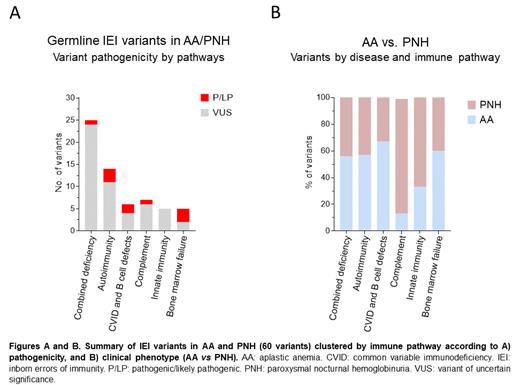Autoimmunity and immunodeficiency can coexist in a paradox fashion. Inborn errors of immunity (IEI) are a heterogeneous group of inherited disorders in which the immune system is disturbed, not only predisposing to infection, but also triggering autoimmunity. While investigating the presence of germline variants implicated in IEI in patients with T-LGL leukemia (Abstract #182344), we serendipitously found that these congenital defects were indeed more frequently encountered in cases with immune cytopenias and, specifically, with BMF.
This finding motivated us to expand our investigation towards AA and PNH. With the advent of NGS, an increasing number of adult-onset IEI has been identified. As compared to classic IEI, autosomal dominant (AD) traits, with non-canonical, less-deleterious-effect variants, and mono-allelic defects for recessive (AR) diseases may occur in these cases, leading to incomplete penetrance and delayed, subclinical or even atypical expressivity.
Few reports have described AA as an unusual manifestation of IEI and, more recently, complement factor H variants have been linked to PNH. 1 Here we hypothesized that rare germline variants predisposing to IEI may contribute to the pathogenesis of AA and its evolution to PNH.
To comprehensively study the presence of IEI traits in such setting, we identified 398 AA/PNH patients, in 57 of whom we performed WGS. We assessed the presence of rare germline variants in rationally selected 120 IEI genes, spanning different immune defects. A stringent variant calling and categorization algorithm to avoid false positives was devised. We excluded variants defined by frequency >1% across genome resources. For the purpose of this study, we selected all pathogenic/likely pathogenic (P/LP) and variants of uncertain significance (VUS) overrepresented in our cohort (significant p value for Obs. vs. Exp. frequencies after multiple-testing correction).
We identified 100 rare variants, 60 of which, involving 36 genes and carried by 37 patients, were significantly overrepresented. The combined allelic burden for these variants was 53% ( vs the expected 3% in normal genomes). All variants were heterozygous (median mutations/patient: 1, IQR: 1-2), and 23 and 37 defects involved genes linked to AD and AR traits, respectively. Overall, 11/60 variants, carried by 10/57 patients (18%), were classified as P/LP, and 10 were in 6 genes linked to AD traits, constituting sufficient basis for immune imbalance leading to disease.
According to the immune pathway, 5 variants involved 3 IEI genes previously associated with BMF ( TERT, TINF2, DKC1), but most of them clustered in alternative IEI categories marked by T- or B-cell defects, autoimmunity, and innate or complement system defects ( FigA). A total of 4/6 genes with at least one P/LP were recurrently mutated ( TERT, AIRE, PRF1, BLK) including loci not previously related to BMF. Remarkably, 3 patients had alterations in a mutational hotspot in the gene AIRE linked to autoimmunity through dominant-negative effects. 2
We also studied genotype-phenotype correlations according to: 1) pathogenicity/inheritance pattern, and 2) immune pathway. Carriers of P/LP and AD defects (since VUS in AD vs AR genes are more likely to be of clinical relevance) had a higher proportion of autoimmunity (35 vs. 8% in non-carriers, p= .02) ( FigB). Despite there were no differences in age of diagnosis, severity of cytopenias or PNH clone presence, suboptimal response to immunosuppression was more frequently registered in carriers (63 vs. 37% in non-carriers, p= .04). Of note, variants associated with innate/complement system were more frequent in PNH (28 vs. 6% in AA, p= .04). Moreover, in patients with initial AA diagnosis, adjusting by sex, age, and PNH clone, innate/complement variants were associated with a higher risk of PNH evolution (aOR: 24, p= .02).
Our study suggests that: 1) variants predisposing to immunodeficiency are overrepresented in BMF; 2) cryptic IEI traits may result in aberrant/incomplete response to otherwise easily cleared antigens, so that immune BMF may eventually arise in these cases from failed compensatory feedback mechanisms; and 3) different pathways are asymmetrically distributed between AA and PNH. We provide new insights on the immunogenomic crossroads between immunodeficiency and autoimmunity, and open the horizon of the IEI spectrum towards the fields of BMF and clonal hematological disorders.
Disclosures
Maciejewski:Regeneron: Consultancy, Honoraria; Novartis: Honoraria, Speakers Bureau; Alexion: Membership on an entity's Board of Directors or advisory committees; Omeros: Consultancy.


This feature is available to Subscribers Only
Sign In or Create an Account Close Modal